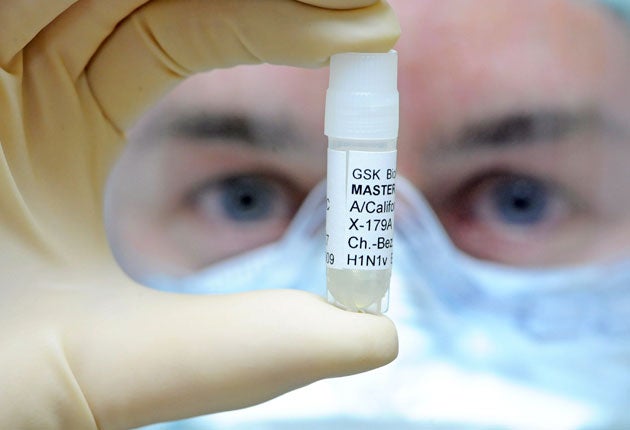Warning on swine flu risk to pregnant women
Cases expected to surge in the autumn and winter as UK total tops 1,3

Your support helps us to tell the story
From reproductive rights to climate change to Big Tech, The Independent is on the ground when the story is developing. Whether it's investigating the financials of Elon Musk's pro-Trump PAC or producing our latest documentary, 'The A Word', which shines a light on the American women fighting for reproductive rights, we know how important it is to parse out the facts from the messaging.
At such a critical moment in US history, we need reporters on the ground. Your donation allows us to keep sending journalists to speak to both sides of the story.
The Independent is trusted by Americans across the entire political spectrum. And unlike many other quality news outlets, we choose not to lock Americans out of our reporting and analysis with paywalls. We believe quality journalism should be available to everyone, paid for by those who can afford it.
Your support makes all the difference.Britain's first death from swine flu of a 38-year-old woman who had recently given birth highlights the risks of the virus in pregnancy, doctors said yesterday.
The woman was named as Jacqui Fleming, from Glasgow, who died in the Royal Alexandra Hospital in Paisley on Sunday. Her baby, named Jack, died at the same hospital last night. A NHS Greater Glasgow spokesman said he did not die from swine flu.
Ms Fleming had two other children and had underlying health problems. Her family said in a statement they were "absolutely devastated". Ms Fleming gave birth a fortnight ago and friends said her condition had fluctuated since. Jack was born prematurely at 29 weeks.
The danger of swine flu to pregnant women was noted by Margaret Chan, director of the World Health Organisation, in her statement declaring the flu a pandemic last week. "Without question pregnant women are at increased risk of complications. This heightened risk takes on added importance for a virus, like this one, that preferentially infects younger age groups," she said.
The immune system is naturally suppressed in pregnancy because the foetus is a foreign body that might otherwise be rejected. This makes pregnant women more susceptible to all infections, including seasonal and swine flu.
John McCauley, a virologist at the National Institute for Medical Research, in Mill Hill, north London, said: "It is not a major effect as humans as a species would not have survived, but there is a degree of concern that the immune system is compromised in pregnancy." Seasonal flu tended to attack the elderly and very young, Dr McCauley said. But swine flu targets younger age groups, including pregnant women, so "we will see more of these kind of effects," he added.
In the US, vaccination against seasonal flu is recommended for pregnant women but it is not in the UK. In addition to an increased susceptibility to infection, pregnant women who contract chest infections such as flu may also suffer worse illness.
Patrick O'Brien, consultant obstetrician at University College Hospital, London, said: "If a woman gets a significant infection in pregnancy there is some evidence that she may suffer more. We know that chicken pox can lead to pneumonia and in most cases it is not a problem. But in pregnant women it can be serious. In pregnancy you don't expand your lungs so much because the baby is pressing on the diaphragm."
"But it is important not to be alarmist. The numbers affected are very small. Approximately 18 per cent of all pregnant women have seasonal flu, yet it doesn't put them at significant risk."
Another 59 patients in England were confirmed as having swine flu by the Health Protection Agency yesterday. The UK total now stands at 1,320 cases and one death. Two Cambridge University students are among the new cases being treated.
Official advice is that pregnant women at risk of contracting swine flu because they have had contact with an infected person should be treated with Relenza, rather than Tamiflu. There is no evidence either drug poses a threat to an unborn child, but because Relenza is inhaled directly to the lungs, a smaller dose is required, thus reducing any potential risk.
Women with swine flu who have given birth should continue to breast feed as long as they are not too ill to do so. It is not known if swine flu can be transmitted in breast milk, but cases of seasonal flu being passed on in this fashion are rare and the benefits of breast feeding are considered to outweigh the risks.
Sir Liam Donaldson, Chief Medical Officer for England and Wales, said: "If we look at the pattern of this illness worldwide, generally for most people it hasn't been a severe illness. They've recovered very well without complications. A small minority have got serious illness and an even smaller minority have died. So, we do have to remain vigilant but remembering that this is a disease that on the whole does not cause serious complications."
Asked about the rise in cases in the UK, he said the numbers were still quite small. "In a bad seasonal-flu winter we would get between 400,000 and 500,000 people falling ill with flu," he said.
"If we look back at past pandemics they've tended to move steadily up during the summer months but then really surge. We're gearing ourselves up for the possibility of a large surge of cases in the autumn and winter."
Join our commenting forum
Join thought-provoking conversations, follow other Independent readers and see their replies
Comments